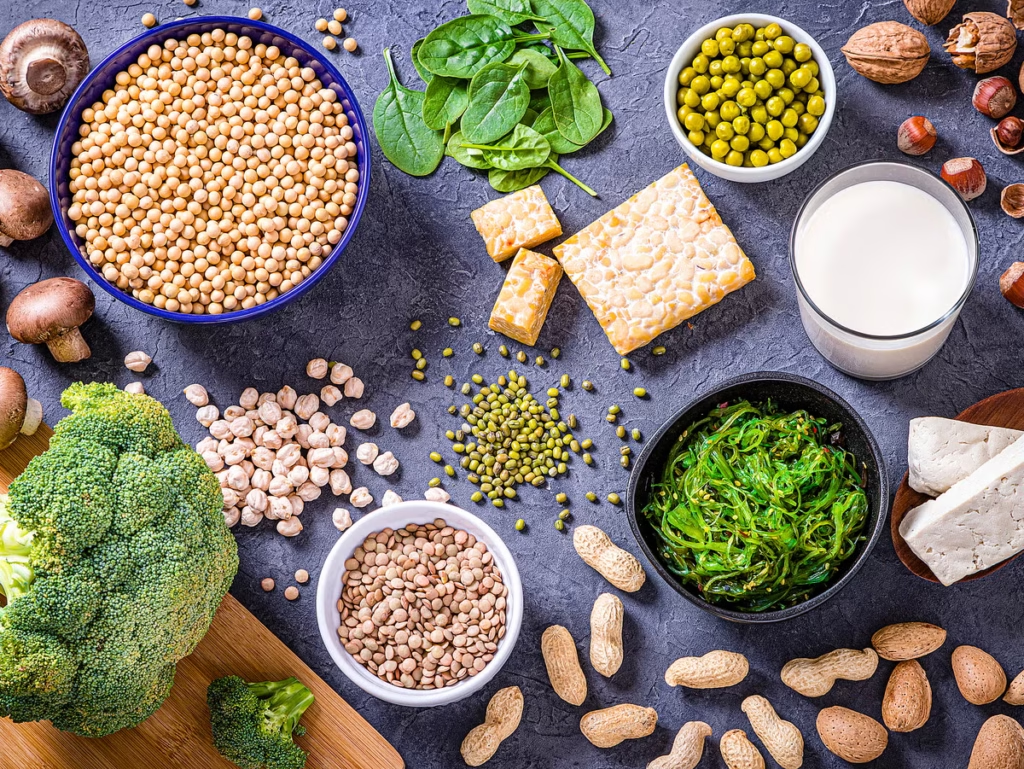How to Get Enough Protein on a Plant-Based Diet: The Complete Guide for the Beginners:

If you’re adopting a plant-based diet or considering making the change, one of the most frequent concerns is: How can I get enough protein without eating animal products? The great news is that it’s absolutely possible to meet your protein needs on a plant-based diet. In this guide, we’ll highlight the top plant-based protein sources, explain how much protein you actually need, and share practical tips to ensure you maintain a balanced and healthy diet.
Why Protein is Essential on a Plant-Based Diet
Protein plays a crucial role in the body by supporting muscle growth, repair, immune function, and overall health. For those on a plant-based diet, ensuring an adequate protein intake is important to prevent nutrient deficiencies and maintain an active lifestyle. But how do you get enough protein when you’re not eating meat, dairy, or eggs?
Understanding Your Protein Needs
Before diving into the best plant-based protein sources, it’s important to know how much protein you need. The general recommendation for adults is:
- 0.8 grams of protein per kilogram of body weight (for sedentary adults)
- 1.2 to 2.0 grams per kilogram for athletes or highly active individuals
For example, if you weigh 70kg (around 154lbs), you would need approximately 56 grams of protein per day as a sedentary adult.
Do Plant-Based Proteins Contain All Essential Amino Acids?
Proteins are made up of amino acids, and some of these are considered essential because the body cannot produce them on its own. Animal products provide all the essential amino acids, but many plant-based foods contain incomplete proteins, meaning they lack one or more essential amino acids.
The good news? By consuming a variety of plant-based foods throughout the day, you can easily get all the amino acids you need without needing to eat everything at once. This is often referred to as protein combining.
Best Plant-Based Protein Sources
Now that you understand your protein needs, let’s look at some of the best plant-based protein sources available in the UK and US. These foods can help you meet your daily protein goals and ensure you’re getting the nutrients necessary for a healthy lifestyle.
1. Legumes: Beans, Lentils, and Chickpeas
Beans, lentils, and chickpeas are some of the best sources of plant-based protein. They are packed with fiber, iron, and folate, and are incredibly versatile. Here’s how much protein you can expect from some popular legumes:
- Lentils (1 cup cooked): 18 grams of protein
- Chickpeas (1 cup cooked): 15 grams of protein
- Black beans (1 cup cooked): 15 grams of protein
2. Tofu and Tempeh
Tofu and tempeh, made from soybeans, are high in protein and provide a complete source of amino acids. Tofu is a great substitute for meat in various dishes, while tempeh has a firmer texture and nutty flavor. Here’s the protein content:
- Tofu (1/2 block): 10 grams of protein
- Tempeh (1 cup): 21 grams of protein
3. Seitan (Wheat Gluten)
Seitan is a high-protein meal source from wheat gluten. It has a chewy, meat-like texture, making it a great option for vegan and vegetarian dishes. It contains about 25 grams of protein per 3-ounce serving, making it one of the highest-protein plant-based options.
4. Nuts and Seeds
Nuts and seeds are nutrient-dense and high in protein, healthy fats, and fiber. They are perfect for adding protein to smoothies, salads, or snacks. Some top options include:
- Almonds (1/4 cup): 8 grams of protein
- Chia seeds (2 tablespoons): 5 grams of protein
- Hemp seeds (3 tablespoons): 10 grams of protein
- Peanut butter (2 tablespoons): 8 grams of protein
5. Quinoa and Whole Grains
Quinoa is a Complete Rich protein containing all nine essential amino acids. Other whole grains, like oats, brown rice, and barley, also provide a good amount of protein. Some protein content examples:
- Quinoa (1 cup cooked): 8 grams of protein
- Oats (1/2 cup cooked): 6 grams of protein
6. Vegan Protein Powders
For those with higher protein needs or who have trouble getting enough from whole foods, vegan protein powders are an excellent option. Look for powders made from pea protein, hemp protein, or brown rice protein, which provide all the essential amino acids.
How to Balance Your Protein Intake on a Plant-Based Diet
Keep protein-packed snacks handy, like nuts, seeds, or edamame. These snacks can help you maintain energy levels and ensure you meet your daily protein needs.
Ensuring a balanced intake of protein on a plant-based diet is all about variety. The best way to get enough protein is to incorporate a mix of different protein-rich foods throughout the day. Here are a few simple tips:

1. Eat Protein-Rich Foods at Every Meal
Try to include at least one source of protein in every meal. For example, start your day with oats topped with chia seeds and almond butter, enjoy a lentil soup for lunch, and have quinoa and tempeh stir-fry for dinner.
2. Combine Different Plant Proteins
While some plant proteins are incomplete, combining different foods throughout the day ensures you get all the essential amino acids. For example, beans paired with rice or hummus with whole-grain bread are excellent combos.
3. Snack on Protein-Rich Options
Protein Supplements: Are They Necessary?
While most people on a plant-based diet can get enough protein from whole foods, some individuals may choose to use protein supplements. If you’re an athlete or have specific dietary restrictions, a protein supplement (like pea protein or soy protein isolate) can help you meet your goals.
However, it’s always a good idea to consult with a healthcare provider before starting any new supplement to make sure it fits with your overall health plan.
Common Myths About Protein on a Plant-Based Diet
Myth 1: Plant-Based Protein is Incomplete
Plant-based protein sources can be complete if you eat a variety of foods. Quinoa, soy, and hemp seeds are examples of complete plant proteins.
Myth 2: You Can’t Build Muscle on a Plant-Based Diet
Many athletes and bodybuilders thrive on a plant-based diet. With the right protein intake, strength training, and nutrition, building muscle is completely achievable on a plant-based diet.
Conclusion: Your Protein Needs on a Plant-Based Diet
Getting enough protein on a plant-based diet is entirely achievable with a little planning. By including a variety of legumes, tofu, tempeh, nuts, seeds, and whole grains, you can easily meet your protein needs. Remember to balance your meals, eat protein-rich snacks, and enjoy a diverse range of plant-based foods to ensure you get all the essential nutrients.




